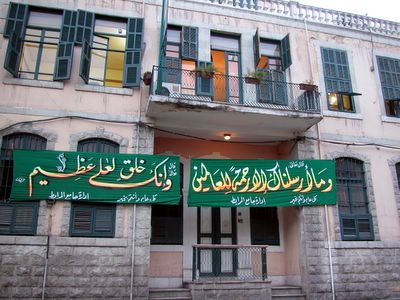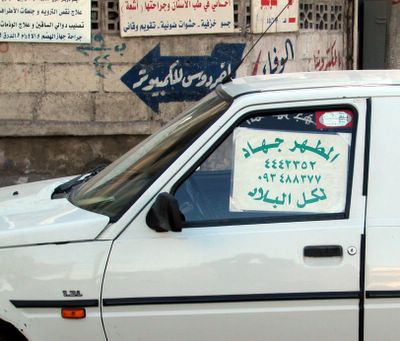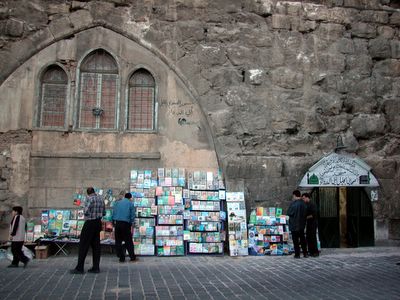4/29/2005
Ottoman Mosque
4/27/2005
Haunted By Her
When I am always haunted by you?
Forgive me if I did not reveal my passion to you
For the sweetest thing about love is concealing.
4/24/2005
In Remembrance
Armenian Syrians today mark the 90th anniversary of the mass deportations and killings of Armenians in Ottoman Asia Minor in 1915. Hundreds of thousands of Armenians then sought refuge in Syria to escape the killings, famine and economic difficulties. Today, they constitute an integral part of the Syrian society. 75 percent live in the northern city of Aleppo and nearly 20 percent in Damascus. The rest are scattered in other Syrian cities and towns. Throughout the years, Syrian Armenians were able to maintain their traditions and customs, and to preserve their culture and language. Most belong to the Armenian Orthodox Church. The picture shows a memorial stone in the Armenian Church in Damascus:
"In Memory of Our Martyrs. 24 April 1915".
Addendum: Read about Aleppo's observance of the anniversary at Aleppo Post
4/23/2005
The Lycée

The Lycée Francais School was established in 1930 by the Mission Laique Francaise (French Laic Mission). Its beautiful building on Baghdad Street was designed by French architect Victor Erlanger. In 1967, the school was nationalized, along with other private schools in Damascus and was renamed Lycée Al-Houriet (Freedom). In 1994, it was renamed Lycée Bassel Al-Assad, but it's still known among Damascenes simply as Al-Laique.
4/21/2005
Mercy Upon Mankind

Muslims today celebrate Al-Mawlid Al-Nabawi, the birthday of Prophet Muhammad (PBUH). In Damascene traditions, which are less practiced today, Al-Mawild used to be a widely celebrated occasion. Neighborhoods would compete in organizing large 'arada processions; and mosques would be illuminated with colorful lanterns or lamps and filled with people who gather to listen to the story of Muhammad's birth and life, and to inshad (religious singing) in praise of the prophet, then go back home with small packs of white Mulabbas (almonds covered with sugar) which is especially made for the occasion.
This banner on a house in Muhajirin, opposite to Al-Murabit Mosque, carries a verse from the Holy Quran (21:107), summarizing the message that was delivered by Muhammad:
"We sent thee not, but as Mercy for all mankind"
4/17/2005
Independence Day
Our good hopes and heart beats
Surround the flag that unites the Nation
Does it not have the black color of every eye?
And the red color of every martyr's blood?
From the Syrian National Anthem
(Lyrics by Khalil Mardam Bey, Music by Flayfel Brothers)
4/15/2005
Humble Home

President Shukri Al-Quwatli (1892-1967), one of the heroes of Syrian independence, lived in this humble rented apartment in Al-Jisr Al-Abiyad neighborhood. Al-Quwatli was the most prominent leader of the National Bloc that led political resistance against the French mandate. He served as President in the periods 1943-1949 and 1955-1958, which were the golden years of Syrian democracy. Al-Quwatli left Syria after the military coup by Baath Party in 1963. He lived in Geneva then in Beirut until his death on June 30, 1967, only twenty days after Syria's disastrous defeat in the Six Day War and the loss of the Golan Heights to Israel.
4/13/2005
Faroukh Shah
4/11/2005
The Circumciser

In Damascene tradition, a boy's circumcision used to be an important event attended by family and relatives who fill the house before the arrival of the "circumciser." Enthusiastic visitors shouting greetings and special 'arada songs would make it difficult for the crying poor boy to be heard. After the boy is officially circumcised, he would be proudly paraded in the neighborhood with a red tarboosh on his head and with him holding the white ghallabiyeh robe a few inches away at the front, so that to avoid any possible pain. Today the circumcision is no longer celebrated, as boys are usually circumcised at hospital during their first week of life. However, some people still prefer to do it at home with the help of a "circumciser," like this one announcing his services and cellphone number to passers-by.
4/08/2005
Burial Place

Outside the mosque and burial place of Abu Al-Darda' in the Citadel of Damascus. Abu Al-Darda' was a companion of Prophet Mohammad (PBUH) and one of the narrators of Hadith (sayings of the Prophet). After the Muslim conquest of Syria, he resided in Damascus and became the city's judge during the reign of Caliph Uthman Ibn 'Affan. He died in 653.
4/06/2005
White & Pink
4/03/2005
Papal Prayer

I remember when Pope John Paul II visited Syria in 2001. The Pope held a mass in Al-Abbasiyeen Stadium in Damascus and visited the Umayyad Mosque, becoming the first Catholic pontiff to enter a Muslim place of worship. In an address at the Mosque, in the presence of late Grand Mufti Sheikh Ahmad Kuftaro, the Pope said:
"For all the times that Muslims and Christians have offended one another, we need to seek forgiveness from the Almighty and to offer each other forgiveness [...] May the hearts of Christians and Muslims turn to one another with feelings of brotherhood and friendship, so that the Almighty may bless us with the peace which heaven alone can give. To the One, Merciful God be praise and glory for ever. Amen."Later during his landmark visit, the Pope went to Quneitra, a town in the Golan Heights liberated from Israeli occupation in 1974. Standing in a small church that was burnt and ransacked by the Israelis, the Pope prayed for peace and justice in the Middle East:
"From this place, so disfigured by war, I wish to raise my heart and voice in prayer for peace in the Holy Land and in the world [...] Lord, you speak words of peace to your people and to all who turn to you in their hearts. We pray to you for the peoples of the Middle East. Help them to break down the walls of hostility and division and to build together a world of justice and solidarity [...] May they be inspired to oneness of heart and mind, in working for a world that will be a true home for all its peoples. Salam! Salam! Salam!"Today the church is still deserted as it has been for 38 years, still waiting for the Pope's prayer to be answered... May his soul rest in peace.
4/02/2005
Safe Cycling

Some suggest that encouraging people to use bicycles in downtown Damascus will help reduce traffic jams and air pollution in the city. However, cycling in Damascus can be very dangerous, especially with the carelessness of motor-vehicle drivers, the weak enforcement of speed limits and other traffic rules, and the absence of special bicycle routes.






